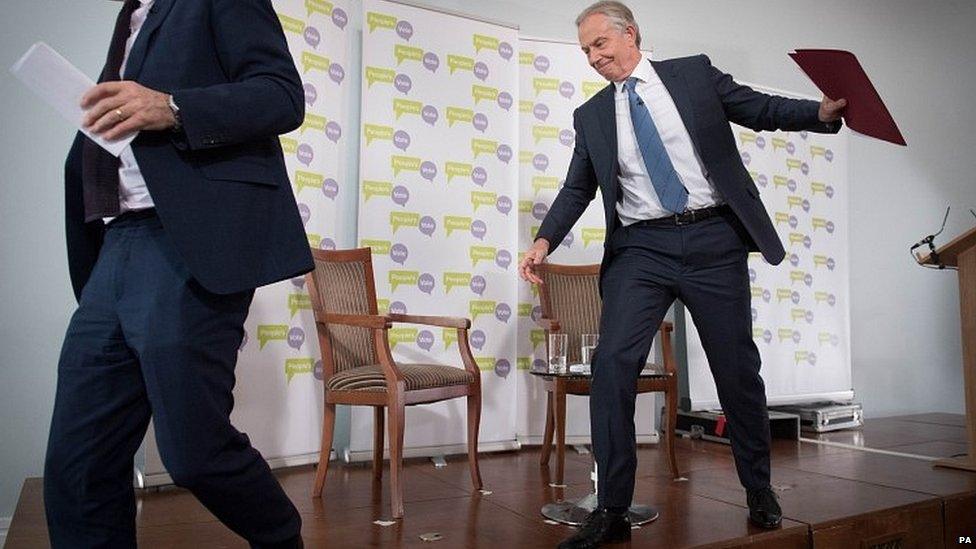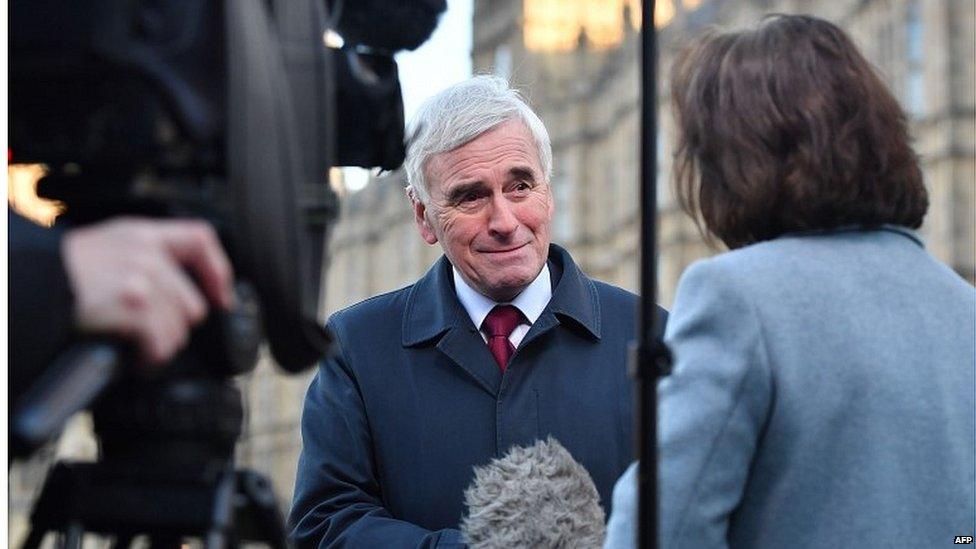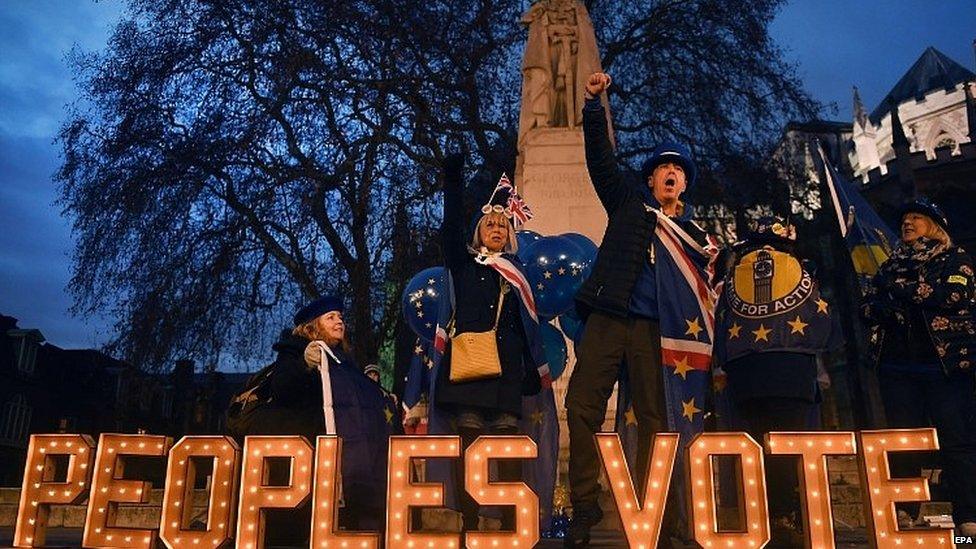Brexit: Are cracks showing in Labour's referendum unity?
- Published

The former prime minister can see a clear path to another referendum
When the party of government is conducting something akin to a political civil - or perhaps that should be uncivil - war, the main party of opposition will seem united by comparison.
Certainly Theresa May's deal has succeeded in bringing her opponents together to denounce it.
But according to the former Labour Prime Minister Tony Blair, the position of both frontbenches on Brexit is "weird".
He believes Theresa May is wasting time seeking to resuscitate a deal that he has pronounced as dead.
And there is the spectacle of the current Labour leader holding back from tabling a confidence motion in a government he wants to remove.
More about that later…
Tony Blair now puts the likelihood of a new referendum at "above the 50% mark". He revealed that he had been speaking to Labour MPs who represent Leave areas in recent weeks.
He's been trying to reassure them that giving people a final say wouldn't lead to Brexit-backing voters call time on their parliamentary careers.
His argument is that a referendum would be framed as a regretful consequence of a gridlocked parliament. But their fears are not the only, indeed, not the main, barrier to gaining a new referendum.
Fragile unity
Labour's official policy is to call for a general election. And, if that doesn't happen, to keep all options on the table - including campaigning for a "public vote".
This just about kept the party united at its annual conference in the autumn, But now the strains are beginning to show.
Again there is unity around calling on Theresa May to bring her deal to Parliament next week rather than waiting until January.
Beyond that, the parliamentary party's apparent solidity begins to fracture.

There have been tensions at the top of the party over the issue
MPs who back Tony Blair's position on a referendum - such as Chuka Umunna - have called on Jeremy Corbyn to table a motion of no confidence in the government.
The calculation is that it would fail because the DUP (on this issue at least) would back the Conservatives.
That would then tick the policy box - Labour has asked for an election, hasn't got it, and now it can move on to at the very least discussing the option of a new referendum.
But because it wouldn't succeed in bringing the government down, Jeremy Corbyn is unlikely to table a formal vote of confidence next week.
He is also not enthusiastic about confronting the prospect of a new referendum as a consequence.
Instead, we may well see a non-binding censure motion being tabled if Theresa May indeed delays the vote on her deal.
So, political damage could be inflicted on the Prime Minister without it rebounding and causing a problem for the Opposition leadership.
Shadow boxing
But as Tony Blair's former spin doctor Alastair Campbell - a leading advocate for a new referendum - warned his fellow campaigners: "it may be time to face up to the fact that Labour under Jeremy Corbyn will do everything to make sure a People's Vote won't happen".
Certainly - from a different perspective - that is Labour leaver Kate Hoey's view of Jeremy Corbyn's position too. She and he were both Eurosceptic rebels through the Blair and Brown years.
And while the option of a "public vote" is Labour policy, I understand behind the scenes in the shadow cabinet the issue is proving highly contentious.

People's Vote campaigners want Labour to come on board and quickly
I am told that party chairman Ian Lavery and shadow justice secretary Richard Burgon have been arguing strongly against committing the party to a referendum - even further down the line.
Jon Trickett and - perhaps unsurprisingly, given his public statements - the shadow international trade secretary Barry Gardiner take a similar view.
The shadow education secretary Angela Rayner was never seen as a staunch opponent of the idea but did suggest another referendum could be seen as "undermining democracy" on BBC's Question Time.
The shadow Brexit secretary Sir Keir Starmer said at Labour's conference - without clearing it with his party leader - that Remain should be an option if there were a new referendum.
But I am told privately he has been quite cautious about when to commit to a new vote - and whether it could be won.
The shadow chancellor John McDonnell's relatively warm language towards the referendum option in recent weeks - even agreeing that under certain circumstances it could become "inevitable" - has led to tensions with the leader's office.
Many younger activists in Momentum - the movement John McDonnell and ally Jon Lansman set up - support the position of "remain and reform" the EU and the left-wing Another Europe Is Possible - along with unions such as the GMB and TSSA - want a new vote.
Third way - no way?
There are those in Labour's ranks who think there is a "third way" between rejecting the May deal and signing up to a new vote.
The chair of the Commons Brexit committee, Hilary Benn, favours a 'Norway Plus' option - staying economically close to the EU but outside its political structures.
Tony Blair tells Today the EU would help the UK remain if it was "prepared to think again"
Rayner: New referendum 'undermines democracy'
He wants Parliament to be able to vote on this option but I am told that Jeremy Corbyn does not want to embrace this policy, which would involve staying inside the single market.
Tony Blair's prediction is this: He doesn't necessarily think that the current Labour leadership will ever embrace a new popular vote.
But if Parliament rejects every other option, he believes Labour MPs will be faced with a stark choice between extending Article 50 and backing a new referendum, or leaving with no deal.
Under these circumstances, he argues, an "overwhelming" number of Labour MPs would opt for a new vote - and could cite party policy as cover.
Hilary Benn isn't so sure. He also thinks there is a danger that Parliament rejects all options - including his favourite, Norway.
But that this wouldn't necessarily lead to a new referendum. "All of the options have real and genuine difficulties," he told Radio 4's 'Political Thinking' podcast.
"All of the options have real and genuine difficulties. It may be that the prime minister decides 'well, I'm taking my deal to the country.'"
Well that, in its own way, really would be a People's Vote.